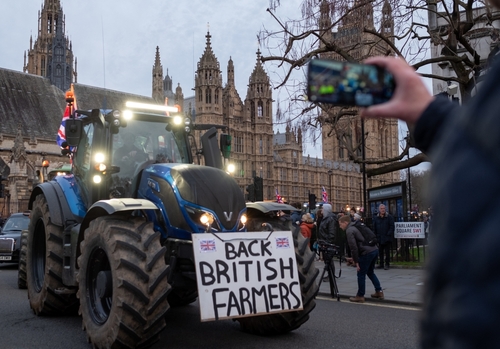On food security the UK State is a joke
- Like
- Digg
- Del
- Tumblr
- VKontakte
- Buffer
- Love This
- Odnoklassniki
- Meneame
- Blogger
- Amazon
- Yahoo Mail
- Gmail
- AOL
- Newsvine
- HackerNews
- Evernote
- MySpace
- Mail.ru
- Viadeo
- Line
- Comments
- Yummly
- SMS
- Viber
- Telegram
- Subscribe
- Skype
- Facebook Messenger
- Kakao
- LiveJournal
- Yammer
- Edgar
- Fintel
- Mix
- Instapaper
- Copy Link
Posted: 22 January 2025 | Dr Clive Black | 2 comments
It could be argued that Clive Black is not entirely happy with the UK Government’s efforts to improve the food industry…


Labour inherits a chaotic food system
In fairness to Labour, the long-standing Tory regime was pretty chaotic, poor in capability, bad at thinking things through – most startlingly Brexit – and ultimately a rudderless sham of self-interest. For any food system such an appalling state is a headwind, the electorate was correct to depose them and Labour is correct in saying they inherited a mess. As an aside, it should also be said that under the Tories the capability, sense of purpose and productivity of far too many public servants in Whitehall, the devolved administrations and the vast array of agencies that often impede and distract progress at huge cost – productivity and public service has collapsed in the UK – is also a major headwind for the new regime. Indeed, it is interesting to hear senior politicians such as Starmer and McFadden start to single out the self-service of bureaucrats so soon into governing.
Labour’s policy missteps and their impact on food security
While this is a far from ideal context, thus far Labour has been little short of a car crash for the British food system, with its one policy on food, enhancing security, being in greater jeopardy as a result of only six months of policy making. Again, some issues are a result of inaction and flawed thinking by the Tories – eg, lack of arrangements with the EU on food trade and the basis for confidence that regulations such as the forthcoming Employment Bill and the imminent Extended Producer Responsibility (EPR) will work for the system and society being virtually nil.
However, the Autumn Budget from Reeves featured a multitude of questionable plans, with businesses being clobbered with massive taxes on labour while the domestic farming sector is rightly up in arms about proposals on inheritance and agricultural business relief. Here, we see ideology, naivety and stupidity coming together to anger farming and the wider food system from food processor to supermarket. In the interim, the cost of UK Government borrowing, known as gilt yields (the interest rate charged on bonds it issues to supplement revenues from taxes in order to meet spending plans), has rocketed and sterling has weakened – international investors are making their thoughts clear. Several factors come to mind on these big matters. Firstly, the government should have raised meaningful and simple taxes (income tax, employees National Insurance and/or VAT), as smaller tax pools have to raise too much.
The country needs a Minister that listens and consults, co-ordinates and brings the narrow dysfunctional fiefdoms of Whitehall together to deliver for the public.
The urgent need for better leadership in food policy
These policy developments, aside from being inflationary, are incredibly harming to the UK economy, with a probability of mass unemployment in time if the government continues on its present trajectory, and they work against investment in the British food system to improve food security. As ever with DEFRA, policy on this big subject is piecemeal, usually consisting of mere crumbs to announce at the NFU or Oxford Farming conferences, while missing the big picture.
All actors within the food system understand this and view DEFRA and the wider government at this time with disdain. Such a position is wholly unhealthy and unsustainable and will lead to unintended but real consequences if the policy agenda is not properly thought through following adequate consultation. If ever there was the need for a Minister of the Food System after the first six months of Labour mismanagement, it is now. The country needs a Minister that listens and consults, co-ordinates and brings the narrow dysfunctional fiefdoms of Whitehall together to deliver for the public; noting that Britain’s civil service is increasingly self-, not public-, serving.
Such words are harsh, but they are grounded in reality, and they do not reflect the anger of the food system from farm to the fork in the independent cafe that may close post April as the combination of the Employment Bill, National Insurance Contributions, and the National Living Wage, among other things, kick in. Meanwhile, we go backwards on food security with no substantial sector thinking, making the UK more, not less, vulnerable in this important area in an increasingly volatile world. More frustrating still, a big opportunity to deliver economic growth from that industrial system is simply being thrown away.
Rant over.
About the author







A very interesting rant Dr Black and I would agree with all that you said. However finding a single Minister with the necessary ability to take the bull by the horns and radically reorganise the shambles in the present system is like looking for a needle in a haystack. Could you honestly name one? I couldn’t.
Please keep platforming insight, knowledge and wisdom at volume. As a farmers of course it’s concerning- but honestly trust us when we are honestly deeply worried for our island nations security, no AI replacement to feed us, a conflict, climate event, geopolitical issue, breaking of input supplies, it wouldn’t take much to prevent the basis of life being supplied ie food. – this government have blindly removed sustainable food supply for the public and pitched it as farmers don’t pay tax- this isn’t about just the iht bill but the repercussions and consequences which are entirely irreversible if this goes ahead. Farmers do not have volume so we need anyone with volume to shout up, we need those who will feel the consequences to shout up now- do not sit and wait as it will get to a point where it is too late